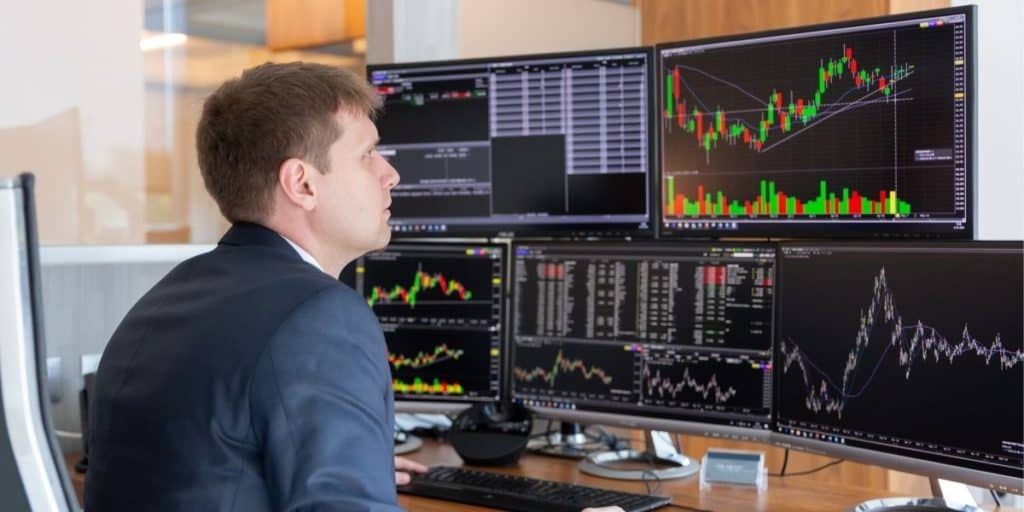Many traders see Exchange-Traded Funds, or ETFs, as safer investments than individual stocks, and as such, they are pretty popular in the trading world. The price of ETFs can change a lot during the day, but can it change after the market closes? Do they move after hours as well?
ETFs move after hours and their price changes after hours as well. But they can only move after hours during the week. While you can still place your buy and sell orders for ETFs on the weekend, they won’t be fulfilled until Monday. The price changes after hours based on supply and demand.
During this article, you will learn more about after-hours trading and how it relates to ETFs. You will also find out whether you can get in on the action or if you should.
IMPORTANT SIDENOTE: I surveyed 1500+ traders to understand how social trading impacted their trading outcomes. The results shocked my belief system! Read my latest article: ‘Exploring Social Trading: Community, Profit, and Collaboration’ for my in-depth findings through the data collected from this survey!
Table of Contents
ETFs Trading After Hours
After hours or extended hours, trading occurs after the market closes. For US Stock Exchanges, that would be between 4 and 8 PM.

ETFs are traded on the exchanges like regular stocks, which means they can also move after hours. The price of the ETFs fluctuates during that time. In fact, prices are a lot more volatile after hours and sometimes don’t reflect the actual value of the shares.
It is also essential to understand that after-hours trading is only possible during weekdays.
On weekends and during holidays, the market is closed, and you won’t be able to buy or sell. You can still place orders, but they will only be fulfilled after the market opens again. The price of ETFs on weekends will be the same as the last price that ETF traded for on Friday.
With that said, some brokerages will allow trading on weekends, usually responding to important news or developments.
How Does It Work?
During regular hours, ETFs are bought and sold on the exchanges. However, with the existence of Electronic Communication Networks, or ECN’s, the stock exchanges are no longer necessary, and trading can continue even after the market closes.
This network automatically connects and matches buy and sell orders on the market. Since everything happens through this network, exchanges and third parties are no longer needed. They can connect brokerages and traders from all over the world, allowing for quick and secure transactions.
Can Everyone Participate in After-Hours Trading?
In the past, after-hours trading used to only be reserved for institutional investors. Now, however, the market is as open as ever, and many platforms and brokerages allow regular traders to participate in extended-hours trading.
The only thing you need to get into the action is a brokerage account with a trading platform.
Many brokers today offer after-hours trading as a feature, but you need to make sure that they do before opening an account.
How Are ETFs Priced?
The price of an ETF depends on two factors:
Value of fund holdings
The value of the fund commodities is also referred to as NAV (Net Asset Value), which represents the total value of all securities included in the ETF, minus any liabilities, divided by the number of shares.
The NAV is calculated once each day, based on the last prices of all commodities listed in that particular ETF.
Supply and demand of the ETF
While the NAV is the closest thing to a realistic price for an ETF, it isn’t what solely determines the actual cost that the ETF is listed for during trading hours.
As with anything else on the market, supply and demand is still king, and if the demand for a particular ETF is very high, the price can reach unrealistic figures. The opposite can also happen.
Whether trading during the day, extended hours, or weekends, these two factors are the driving forces behind the price of all ETFs.
Why Trading During Extended Hours Might Be Riskier?
In general, trading during extended hours is considered riskier than in regular trading hours. There are a few reasons for that:
Price Volatility
There are fewer buyers and sellers participating in the after-hours market. Most investors stop trading as soon as the bell rings, which makes the prices of most ETFs far more unstable. The volatility doesn’t usually carry over to the morning when the market opens due to the sheer influx of traders, stabilizing the price.
Dominated by Institutional Investors
In recent years, individual traders may have gotten access to the after-hours market, but that doesn’t mean that institutional investors still dominate this market.
Since fewer individual traders and small-time brokerages are participating during these hours, the institutional investors who are far more resourceful can easily manipulate prices and win head-to-head battles against other investors.
Wider Spreads
The Spread is the difference between the buying and selling price of a stock in the market. The decrease in volume of traded stock during after-hours due to the reduction in traders leads to wider spreads.
When the spreads are high, you will most likely have to overpay for the ETF you want to buy.
Additionally, a disadvantage of trading in the after-hours market is that some brokerages charge a fee per share you purchase. If you frequently trade during these hours, the costs can add up quickly and damage your portfolio in the long run.
Two Reasons Why You Should Trade During Extended Hours
Despite some noticeable advantages, you should generally try to avoid trading during extended hours due to the risks involved. The only two circumstances when you might want to participate include when something big happens after hours or if you aren’t free to trade in the morning when the market is open.
Let’s take a closer look at these situations.
Something Big Happens After Hours
While the market closes at 4 PM, news about companies and the stock market can come out at any time. There might be a considerable development with a specific company that you can’t pass up on, which might prompt you to trade during after-hours.
If the development is such big news that many traders want to jump in on it, this might stabilize the market due to increased volume.
You Aren’t Free to Trade in the Morning
If you’re too busy to trade while the market is open, you can consider trading during extended hours. Most people are at work when the market is open from 8 AM until 4 PM, so they might not have another option.
However, if possible, you should still try to avoid it and wait for a day when you will be free to trade in the morning.
Why Should You Trade ETFs?
If you’re still on the fence about whether you should trade ETFs, here are a few reasons why you shouldn’t think twice:
Diversification
Seasoned investors talk about diversification all the time, and for a good reason. You never want to put all eggs in one basket and invest your entire account in one or two stocks. Diversification is vital for risk management, and there are very few better ways to diversify your portfolio than with ETFs.
Flexibility
Unlike traditional mutual funds, ETFs are way more flexible to trade. They can be shorted, traded after hours, and easily bought or sold. And they can increase the chance that your portfolio will not lose as much money if the economy fails.
Cost Benefits
Trading ETFs is a lot less costly than mutual funds. The main reason is that it is a lot easier for brokerages to keep ETFs in customer accounts rather than dedicate plenty of staff to handle thousands of investors in a mutual fund.
There are also tax benefits associated with exchange-traded commodities. You will only have to pay tax once when you sell your ETF.
Author’s Recommendations: Top Trading and Investment Resources To Consider
Before concluding this article, I wanted to share few trading and investment resources that I have vetted, with the help of 50+ consistently profitable traders, for you. I am confident that you will greatly benefit in your trading journey by considering one or more of these resources.
- Roadmap to Becoming a Consistently Profitable Trader: I surveyed 5000+ traders (and interviewed 50+ profitable traders) to create the best possible step by step trading guide for you. Read my article: ‘7 Proven Steps To Profitable Trading’ to learn about my findings from surveying 5000+ traders, and to learn how these learnings can be leveraged to your advantage.
- Best Broker For Trading Success: I reviewed 15+ brokers and discussed my findings with 50+ consistently profitable traders. Post all that assessment, the best all round broker that our collective minds picked was M1 Finance. If you are looking to open a brokerage account, choose M1 Finance. You just cannot go wrong with it! Click Here To Sign Up for M1 Finance Today!
- Best Trading Courses You Can Take For Free (or at extremely low cost): I reviewed 30+ trading courses to recommend you the best resource, and found Trading Strategies in Emerging Markets Specialization on Coursera to beat every other course on the market. Plus, if you complete this course within 7 days, it will cost you nothing and will be absolutely free! Click Here To Sign Up Today! (If you don’t find this course valuable, you can cancel anytime within the 7 days trial period and pay nothing.)
- Best Passive Investment Platform For Exponential (Potentially) Returns: By enabling passive investments into a Bitcoin ETF, Acorns gives you the best opportunity to make exponential returns on your passive investments. Plus, Acorns is currently offering a $15 bonus for simply singing up to their platform – so that is one opportunity you don’t want to miss! (assuming you are interested in this platform). Click Here To Get $15 Bonus By Signing Up For Acorns Today! (It will take you less than 5 mins to sign up, and it is totally worth it.)

Conclusion
Trading ETFs in the after-hours market is entirely possible, and everyone can participate. However, due to the risks involved, it is recommended that investors stick to trading in the regular hours of the day.
You can utilize after-hours trading when you aren’t free to trade during the day for some reason or if there is a development that you can’t pass up or wait until the morning for.
BEFORE YOU GO: Don’t forget to check out my latest article – ‘Exploring Social Trading: Community, Profit, and Collaboration’. I surveyed 1500+ traders to identify the impact social trading can have on your trading performance, and shared all my findings in this article. No matter where you are in your trading journey today, I am confident that you will find this article helpful!
Affiliate Disclosure: We participate in several affiliate programs and may be compensated if you make a purchase using our referral link, at no additional cost to you. You can, however, trust the integrity of our recommendation. Affiliate programs exist even for products that we are not recommending. We only choose to recommend you the products that we actually believe in.
Recent Posts
Exploring Social Trading: Community, Profit, and Collaboration
Have you ever wondered about the potential of social trading? Well, that curiosity led me on a fascinating journey of surveying over 1500 traders. The aim? To understand if being part of a trading...
Ah, wine investment! A tantalizing topic that piques the curiosity of many. A complex, yet alluring world where passions and profits intertwine. But, is it a good idea? In this article, we'll uncork...
